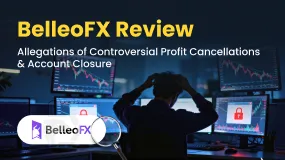Abstract:Delve into the intricate world of Forex market analysis with our informative guide, detailing the crucial aspects of technical and fundamental analysis, vital indicators, and the strategies for interpreting and navigating currency value fluctuations effectively for informed trading decisions.

It takes more than just gut feelings to navigate the Forex market; understanding the rise and fall of currency values needs an analytical approach. Forex, being the biggest financial market globally, has several prospects but also carries some hazards. Making a profit or losing money might depend on one's capacity for thorough market analysis. This in-depth course digs into the complexity of currency market analysis, comparing the nuances of fundamental and technical research and highlighting the most essential indicators used by traders.
Comprehending the Fundamentals
For traders seeking to forecast future currency moves, Forex market research is fundamentally their livelihood. To predict changes in currency pairings, traders look at a wide range of variables, including market emotion, historical data, political developments, and economic indicators. Making educated selections for traders is the goal of this study, which goes beyond simple prediction to include knowledge of the variables influencing the market. Technical analysis and basic analysis are the two main schools of thought, each with its methods and resources.
Deep Dive into Technical Analysis
Technical analysis is an essential element of numerous Forex trading strategies, operating under the premise that price fluctuations and past trading activity are reliable predictors of forthcoming price movements. This approach utilizes chart analysis and statistical indicators to identify market fluctuations. Technical analysis possesses several appealing attributes due to its capacity to enable short-term traders to identify potential buy or sell opportunities through statistical analysis and historical data.
Moving Averages: One of the most crucial indicators in technical analysis is the moving average (MA), which smoothes out short-term swings and gives a better picture of the direction the market is heading by removing noise from them.
Relative Strength Index (RSI): This indicator possibly signals market reversals or corrections by gauging the speed and strength of directional price moves. It helps traders spot overbought or oversold conditions.
Fibonacci Retracements: Using Fibonacci numbers, this method identifies market standstill or reversal points.
MACD (Moving Average Convergence Divergence): Traders seeking to comprehend market patterns and possible turning points rely heavily on the MACD, which provides information about the momentum and direction of certain currency pairs.
The Bigger Picture of Fundamental Analysis
Technical analysis examines price fluctuations' “what” and “how”; fundamental analysis examines their “why.” This technique investigates political, social, and economic currency value variables. Economic indicators like GDP growth, employment rates, and inflation rates may help traders predict currency values, government stability, and other macroeconomic difficulties. Because it provides a complete picture of a currency's strength or weakness, investors who plan to hold for weeks, months, or years favor this strategy.
Important Points to Remember for Fundamental Analysis
Interest Rates: Central banks' interest rate decisions affect currency prices and Forex rates. More interest rates stimulate investment since lenders get higher returns than other countries, boosting currency value.
Economic Indicators: Economic indicators determine a nation's economic health and currency strength. They include unemployment and consumer spending statistics.
Political Stability: Political conditions may affect a nation's currency. Investor confidence affects currency values during political turbulence.
Natural Disasters: Unpredictable natural disasters may cause sudden fluctuations in a currency's value, which is the market's quick reaction to unanticipated difficulties.

A List of Common Questions (FAQs)
1. Fundamental analysis or technical analysis: which is preferable?
Making the proper tool choice for a task is similar to deciding between technical and fundamental analysis. The trading style, goals, and time horizon you work within are the main factors that determine this. For long-term investors, fundamental analysis may be more appealing due to its insights into currency values, whereas technical analysis may be essential to short-term traders due to its accuracy in timing transactions.
2. Where do I even begin when it comes to Forex analysis?
Learning the basics is the first step in doing Forex market analysis. Get a basic understanding of currency trading, learn about technical and fundamental analysis, and then delve into particular indicators and economic issues. Apply your newfound knowledge in a risk-free setting by using a virtual trading account for practice.
3. Do instruments or programs exist for analyzing the Forex market?
Many platforms and analytical tools serve traders. Trader choice is abundant, with platforms ranging from Bloomberg Terminal, which provides extensive financial news and analysis, to MetaTrader 4/5, well-known for its comprehensive technical analysis capabilities.
4. On the side of Forex trading, how significant is economic news?
Economic news is vital to Forex trading since it may swiftly change market sentiment and currency pricing. Workers closely monitor GDP, inflation, and employment numbers to assess a nation's economy. Monetary policy, rate announcements, and geopolitics affect markets. Professional traders anticipate market changes and alter their strategy by monitoring economic calendars and news releases.
5. Does technical analysis have its place?
Technical analysis may identify trading opportunities, but if you use it to evaluate data, you may overlook parts of economic trends and events that might impact the market. By considering geopolitical developments in the economy that may affect currency markets, fundamental analysis may help traders comprehend. A combination approach helps traders analyze market variables and make better trading judgments.
In conclusion
Forex market analysis requires ongoing study and effort to master. Your ability to adjust and react to the signals of the market will determine how successful your strategy is, regardless of whether you prefer to perform technical analysis, which involves closely examining charts and patterns, or fundamental analysis, which entails a thorough assessment of economic conditions and geopolitical events. Traders may traverse the intricacies of the Forex market with more confidence and accuracy by using a balanced strategy that takes advantage of both analytical methodologies.
In the end, controlling risk, comprehending leverage, and keeping discipline in your trading technique are just as crucial to success in Forex trading as movement prediction. Ongoing education, practical experience, and a keen understanding of market conditions will all help you assess the Forex market correctly. Recall that every transaction is a fresh chance for learning, giving you the potential to advance and become better at trading as you hone your analytical abilities.











